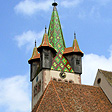STRASBOURG GOTHIC CATHEDRAL
Lady Saints, Devils and Apostles' Procession
 The Strasbourg Cathedral is a masterpiece of the early gothic style. First, a Romanesque era construction begun in 1015, with only the crypt and foundation footprint remaining of its early design, seen in the side doors and support arches. The vision as it stands today is of the Gothic additions which came into vogue while it was being built. The filigreed towering single spire was completed in 1439. At a height of 142 meters, the spire made the cathedral of Strasbourg the tallest building in the western world until 1874 when it was surpassed by the Gothic Revival church of St Nicholas in Hamburg, though that edifice is now a ruin reminder from WWII bombing. Fortunately, Strasbourg’s original survived the fate of multiple wars in this part of the Alsace.
The Strasbourg Cathedral is a masterpiece of the early gothic style. First, a Romanesque era construction begun in 1015, with only the crypt and foundation footprint remaining of its early design, seen in the side doors and support arches. The vision as it stands today is of the Gothic additions which came into vogue while it was being built. The filigreed towering single spire was completed in 1439. At a height of 142 meters, the spire made the cathedral of Strasbourg the tallest building in the western world until 1874 when it was surpassed by the Gothic Revival church of St Nicholas in Hamburg, though that edifice is now a ruin reminder from WWII bombing. Fortunately, Strasbourg’s original survived the fate of multiple wars in this part of the Alsace.
 Victor Hugo, who’s “hunchback” story made him a bit of a cathedral expert, described it as "a skillful combination of monumental size and delicateness". Goethe also praised it, calling it “the” example of German architecture. Goethe was mistaken about that part, though when he was studying law in Strasbourg, it was part of the German Empire. The sandstone of a slightly pink color plays with the sunlight, shifting shades according to the time of day and the façade of cathedral, lined with hundreds of niche sculptures and reliefs which seem to jump out at you presents a picture storybook of the Middle Ages. Take a close looks at the nave entrance, with its curious bas relief of the female saints in the whimsical form of beautiful young ladies crushing devils under their feet and stabbing them through the eyes with righteous pike points in agonizing triumph of good over evil.
Victor Hugo, who’s “hunchback” story made him a bit of a cathedral expert, described it as "a skillful combination of monumental size and delicateness". Goethe also praised it, calling it “the” example of German architecture. Goethe was mistaken about that part, though when he was studying law in Strasbourg, it was part of the German Empire. The sandstone of a slightly pink color plays with the sunlight, shifting shades according to the time of day and the façade of cathedral, lined with hundreds of niche sculptures and reliefs which seem to jump out at you presents a picture storybook of the Middle Ages. Take a close looks at the nave entrance, with its curious bas relief of the female saints in the whimsical form of beautiful young ladies crushing devils under their feet and stabbing them through the eyes with righteous pike points in agonizing triumph of good over evil.
 Inside the massive nave of the church with its beautiful stained glass and rose window, dating from the 12th and 14th centuries, is another masterpiece of a different time, pun intended – the Renaissance Astronomical Clock. The clock, with daily at half past noon performs a delightful show of animated figures representing different stages of life, youth, teenagers, adult and old age, parading past the figure of Death, while above the Apostles parade before Christ, accompanied by the beating of angel’s wings, leading to the Last Judgment. The original astronomical form of the clock with the movements of the heavens was from the Renaissance, similar to examples in Prague (see Prague Orloj Astronomical Clock) and a post war version in York (see York Minster) but the Germanic Swiss influenced glockenspiel mechanism elements were added in an 1842 restoration. For some breathtaking views over the city rooftops and all the way to the Black Forrest across the Rhine when the weather co-operates, climb the 332 steps to the spire platform, though the spire climb takes a separate admission charge.
Inside the massive nave of the church with its beautiful stained glass and rose window, dating from the 12th and 14th centuries, is another masterpiece of a different time, pun intended – the Renaissance Astronomical Clock. The clock, with daily at half past noon performs a delightful show of animated figures representing different stages of life, youth, teenagers, adult and old age, parading past the figure of Death, while above the Apostles parade before Christ, accompanied by the beating of angel’s wings, leading to the Last Judgment. The original astronomical form of the clock with the movements of the heavens was from the Renaissance, similar to examples in Prague (see Prague Orloj Astronomical Clock) and a post war version in York (see York Minster) but the Germanic Swiss influenced glockenspiel mechanism elements were added in an 1842 restoration. For some breathtaking views over the city rooftops and all the way to the Black Forrest across the Rhine when the weather co-operates, climb the 332 steps to the spire platform, though the spire climb takes a separate admission charge.
Visiting Strasbourg Cathedral
The cathedral is open every day from 7 am to 11:20 am, and from 12.35 pm to 7 pm. For the Astronomical Clock, a film begins and noon, followed at 12:30 by the clock’s Procession of the Apostles. Regular admission is €2 with reduced price of €1.50 for children ages 6-18, under 6 are free. To climb to the spire platform is €5 for adults, €2.50 for kids aged 5-18 and Students. © Bargain Travel Europe
Find best hotel and travel deals in Alsace at TripAdvisor
Web
Info
Strasbourg
These articles are copyrighted and the sole property of Bargain Travel Europe and WLPV, LLC. and may not be copied or reprinted without permission.
See Also:
UPPER RHINE VALLEY- ALSACE MEETS THE BLACK FOREST
CHRISTMAS MARKETS BY TRAIN - FROM PARIS

